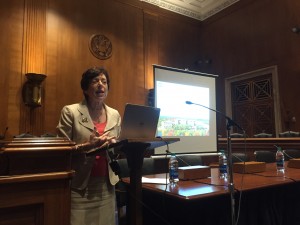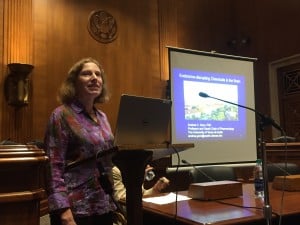On Wednesday September 21, the Dirksen Senate Office Building in Washington D.C., was set upon by Endocrine Society members, staff, members of congressional offices, the media, and other interested parties to learn more about endocrine-disrupting chemicals (EDCs) and the threats they pose to human health.

The seminar, “From Hormones to Brain Development: 25 Years of Groundbreaking Research on Endocrine-Disrupting Chemicals,” provided an overview of the evolving field of EDC research and described new discoveries that have helped us understand how exposures to EDCs contribute to critical health problems such as changes in brain development and reproductive health complications.

There has been dramatic progress over the last 25 years in our knowledge of EDCs. As this knowledge has grown, concerns about the impact of EDCs on the health of adults, children, and future generations have grown as well. EDCs can affect metabolism, growth and development, tissue function, sexual function, reproduction, sleep, and mood, among other things. More work needs to be done to ensure that the public is protected from the harmful consequences of EDCs. In the United States, the National Institute of Environmental Health Sciences at the National Institutes of Health has driven the development of this multidisciplinary field by supporting cutting-edge scientific research on EDCs and their effects on human health.

Speakers included Linda S. Birnbaum, PhD, DABT, ATS, director, National Institute of Environmental Health Sciences (NIEHS) & the National Toxicology Program, Research Triangle Park, N.C.; John A. McLachlan, PhD, former scientific director, NIEHS, Weatherhead Distinguished Professor of Environmental Studies, Tulane School of Medicine, New Orleans, La.; Tracey J. Woodruff, PhD, MPH, director, Program on Reproductive Health and the Environment, professor of Obstetrics, Gynecology, and Reproductive Sciences, University of California, San Francisco, San Francisco; and Andrea C. Gore, PhD, Vacek Chair of Pharmacology, professor, Division of Pharmacology and Toxicology
University of Texas, Austin.

There has been dramatic progress over the last 25 years in our knowledge of EDCs. As this knowledge has grown, concerns about the impact of EDCs on the health of adults, children, and future generations have grown as well. EDCs can affect metabolism, growth and development, tissue function, sexual function, reproduction, sleep, and mood, among other things. More work needs to be done to ensure that the public is protected from the harmful consequences of EDCs. In the United States, the National Institute of Environmental Health Sciences at the National Institutes of Health has driven the development of this multidisciplinary field by supporting cutting-edge scientific research on EDCs and their effects on human health.

